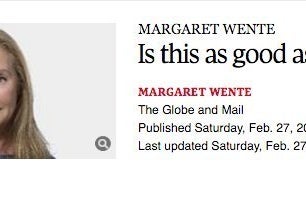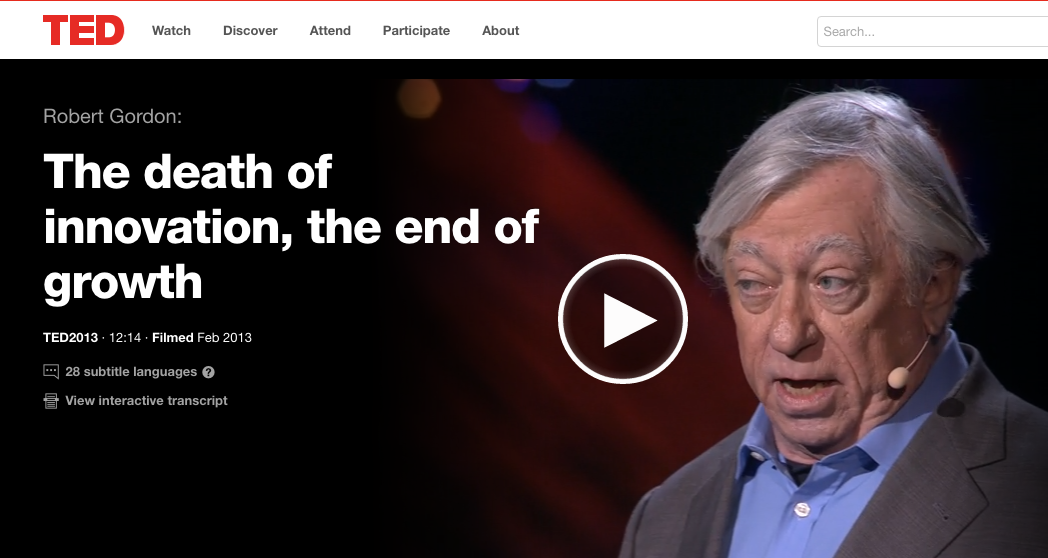A comparison of a February column by Margaret Wente with a book review in the New York Times Magazine shows striking similarities.

Much of Wente's Globe and Mail column about the same book reads like a mirror of the Times' piece, using the same structure, analogies, and phrasing in numerous instances. Her column also appears to include unattributed material from a TED Talk given by the book's author.
Wente was disciplined by the paper in 2012 after she was found to have plagiarized in a column. On Monday, the paper said it was publishing corrections to two more recent columns that contained unattributed passages, but did not say whether Wente would be disciplined again.
On Feb. 17, the New York Times Magazine published a review of Robert Gordon's The Rise and Fall of American Growth.


Ten days later, the Globe published a similar column by Wente in which she reviewed the same book.
The Times' review of Gordon's book begins with an anecdote about the reviewer's grandmother. Adam Davidson writes:
Born in 1890, in a tiny village powered by horses and the sun in a manner hardly changed from the time of ancient Rome, she grew up to witness the invention of the airplane and the adoption of electricity and the telephone.
Wente begins her column with a look back at her grandmother's life, too:
In 1892, when she was born, most households had no central heating, no electricity, no running water, no refrigeration. [...] By the time Grandma died in the 1970s, people’s lives had been utterly transformed.
In introducing Gordon's book, Davidson compares it to the work of Thomas Piketty:
Published by Prince University Press last month, the book is this year's equivalent to Thomas Piketty’s "Capital in the 21st Century"...
Wente also introduces the book with a comparison to Piketty:
This is the theme of Robert Gordon’s contentious new book, The Rise and Fall of American Growth. It’s the kind of work that makes Thomas Piketty’s musings on inequality seem downright cheery.
Davidson notes that Gordon has ruffled the feathers of certain "techno-optimists":
The strongest backlash against Gordon has come from techno-optimists in Silicon Valley, who assure us that more wonders are coming soon.
Wente does as well:
Mr. Gordon, an economist at Chicago’s Northwestern University, is a thorn in the side of the techno-optimists who think that despite our current doldrums, progress is inevitable.
Later, Davidson uses a pie analogy to describe Gordon's ideas:
Economies that are stagnant lead to conflict; if the pie isn’t getting bigger, after all, the only way to improve your lot is to grab someone else’s slice.
So does Wente:
Economic stagnation breeds resentment and upheaval as people fight over a pie that’s barely growing.
Wente, like Davidson, then uses the so-called "economic stagnation" to reflect on the current U.S. presidential race.
Near the end of his review, Davidson declares that he is "more optimistic than Gordon, but for reasons that have little to do with future technological advances." Davidson says he called the author to discuss said optimism. Here's how Gordon replied, according to Davidson:
Your list of needed improvements in institutions and society are a wish list that isn’t happening now and is very unlikely to happen in the future.
Wente does not appear to have spoken to Gordon. Yet she ends her piece both taking the optimist route, like Davidson, and questioning the abilities of modern "institutions," like Gordon:
Personally, I’m an optimist. I believe in the extraordinary power of human ingenuity to expand prosperity and make the world a better place. But at the moment, I have very little faith that the wise men and women who run our institutions have the slightest clue what to do.
Despite the similarities, Wente does not mention Davidson's review in her own or provide attribution of any sort.
Other parts of Wente’s piece are very different from the Times review, but seem to be directly lifted from a 2013 TED Talk by the book's author.

Wente notes in the opening paragraphs of her piece that life was messier in the past:
The internal combustion engine had not yet replaced the horse, which produced mountains of manure and rivers of urine and gobbled up a quarter of American agricultural farmland.
Though the wording is slightly different, the information Gordon provided in 2013 was the same:
Before the motor vehicle, transportation depended entirely on the urban horse, which dropped — without restraint — 25 to 50 pounds of manure on the streets every day, together with a gallon of urine. That comes out at 5 to 10 tonnes daily per square mile in cities. Those horses also ate up fully one-quarter of American agricultural land.
Wente does not attribute this passage to the TED Talk or even mention Gordon's name until the next paragraph. In that paragraph, Wente does quote another part of the TED Talk with proper attribution. The speech is a summary of information and arguments that also appear in the book.
Other passages in Wente’s piece that include statistics and talk of “headwinds” hurting growth also directly match the TED Talk. Gordon says:
There are four headwinds that are just hitting the american economy in the face […] they’re powerful enough to cut growth in half.
And Wente writes:
Several other headwinds will slow down growth.
The passages are not specifically sourced to the speech, but they are presented in the context of Gordon’s work.
The Globe's code of conduct, as referenced by public editor Sylvia Stead on Monday, says: "Any extensive unacknowledged use of another’s words, structure or ideas may constitute plagiarism."
We reached out Monday evening to Wente for comment and will update this post if we hear back.
UPDATE
We've updated this piece to make it clear that Wente directly mentions Gordon's TED Talk in her column and that his talk was a summary of information and arguments from his book.

